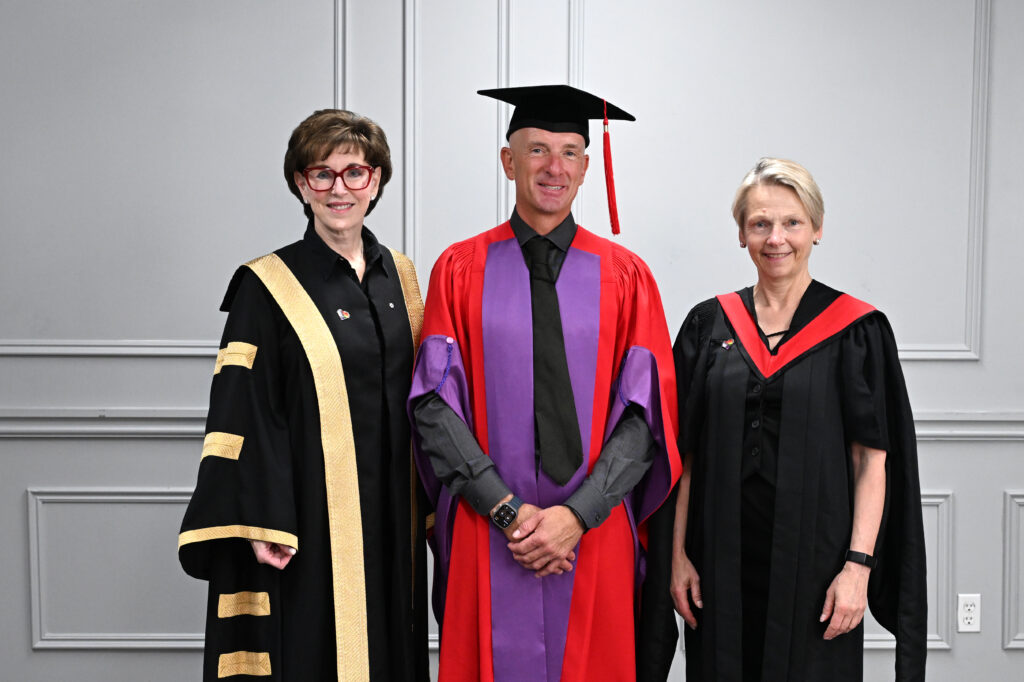
Mike Wessinger, co-founder and executive Chair of PointClickCare, the most widely used cloud-based health-care software provider in long-term and post-acute care, spoke to Faculty of Science graduands about his path to success, and offered advice on how they might navigate their own way to a life of accomplishment.
Wessinger shared with graduands that a question he is often asked is, “What is the secret to success?” With the aim of leaving graduands with advice to take with them on their journey ahead, he shared that the answer – for him – is hard work and determination, above all else.
“Intelligence and emotional quotients do matter,” he stressed. “But, in my experience, the people [with great success] are those people who have the highest grit quotient. If they see a wall, they go over, under, around or through it.”
As Wessinger shared his professional journey, he illustrated how he faced – and overcame – some walls himself throughout his career. Among the first barriers was when he graduated from university as young man with no prospects, no money and the feeling that he was unemployable. He knew he wanted to be a success at something, but was unsure what direction to take. “I had to figure out how I was going to make something of myself,” he said. A break came when his brother helped him find a sales job in the long-term and post-acute care industry. He seized the opportunity and began applying himself. “I knew it was time to really buckle down and really get to work,” he said.

Wessinger familiarized himself quickly with everything he could about the industry he’d joined in order to not only excel in his sales job but find a way to revolutionize it. He hustled – often sleeping at the office and rarely taking time off – until he felt he was successful enough for a new challenge: starting his own business.
Initially, that business was selling existing electronic health records and financial software technology to nursing homes across Canada, but over time he found himself underwhelmed by the product he was selling. This technology is just not working, he thought at the time. It's not making a big impact on these organizations. He believed the long-term and post-acute care space – and especially the seniors who lived within – deserved something more.
Wessinger and his partners decided to build their own solution, one that was ahead of its time: an electronic health records software that wouldn’t be installed on-site, but hosted on servers with clients accessing them through the internet. “We had no idea we were talking about software as a service (SaaS),” Wessinger said. “People couldn't sell SAS back then. Nobody was talking about the cloud. We fundamentally changed the game.”
Not everyone shared that sentiment at the time. As Wessinger moved ahead with PointClickCare, it was the year 2000, shortly after the infamous dot-com bubble had burst, a time when many were wary of internet-based businesses. As Wessinger approached venture capitalists and banks with his startup idea, he joked that doors tended to close the instant he explained his mission to put seniors' health records online.
Wessinger had to find a financial solution somehow, and he found it close to home. “The only people that were kind of enough to fund us go by the name of ‘Mom,’ ‘Dad,’ ‘Uncle,’ ‘Aunt’ and ‘Friend from Hockey Team,’” Wessinger said. With that came not just the usual high financial stakes of making a startup succeed but personal stakes, too. “I felt this enormous obligation to be successful,” he said.
Two decades later, PointClickCare is now one of the largest privately held software companies in Canada, with over 1,500 employees, and serving over 22,000 skilled nursing facilities across North America. “The thing I'm most proud of is that there are some two million seniors today that I know are getting the right care because they're utilizing our software,” he said.
While the journey of a startup firm may be succinctly summarized in an honorary degree recipient’s address, the reality is a long road full of challenges, long hours and – sometimes – sacrifices. While Wessinger told graduands hard work is the “hack to success,” he offered some cautionary advice as well, for the ambitious. “People that are like me – forward-looking, a leader of an organization, trying to do something incredible – live in the future,” he said. While that can help those looking to advance their careers and businesses realize their goals, it can come with a risk, he noted.
Living, mentally, in the future all the time can remove a person from the present. “You have to stop and live in the now because that’s all you have,” he said. “I can remember my family would see me at the dinner table and sometimes say, ‘Where are you?’ I'd say, ‘I'm right here.’ They’d say, ‘No you’re not.” They were right. I wasn’t. I was somewhere else. Along the way, as you're achieving great things, remember to stop and celebrate and live in the present.”
